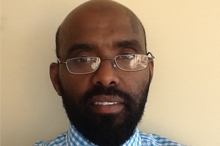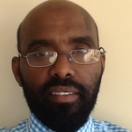

Mohamed was recognized as a White House Champion of Change in Community Resilience and Preparedness.
My education is in health. In Somalia and Kenya, I studied tropical medicine and conducted biomedical research, and once I immigrated to the United States, I completed a master’s degree in public health.
But I’ve found that many of my fellow Somalis face a much different situation. They confront many challenges accessing, understanding, and receiving health services and information. Health issues can be daunting, and few organizations are well equipped to handle the customs and language of my community. As a result, my people are suffering.
The gap in the refugee health experience weighed on me, and I wanted to do something to ensure my community had access to information that would protect them. Like many opportunities for change, mine came swiftly and suddenly – in the way that storms do.
Last winter, a major wind and ice storm was headed for the Puget Sound area where I live. The last time a storm of this size hit, over 200 people were hospitalized for carbon monoxide poisoning and eight people died. Most of the victims were from local immigrant communities who did not have access to information that could have prevented the poisonings.
As a community health leader, I knew it was important to help my community by warning them. I joined forces with other Somali religious leaders, community leaders and staff at Public Health – Seattle & King County. I explained the dangers of carbon monoxide to my peers and organized a rapid communication strategy for getting the message out. We sent an automated phone call to Somalis in King County, and included my personal contact information in case of questions.
It didn’t take long for the calls to pour in, and through these calls, I learned that a number of Somalis families had lost power. I worked with Public Health – Seattle & King County and local emergency management to identify shelter options and collaborated with Abubakr Islamic Center, a local mosque, to set up a culturally appropriate shelter. Then the Executive Director of the Islamic Center and I rented four-wheel-drive vehicles to deliver hot meals and to transport people to warmth and safety.
After the storm had cleared, we learned that not a single life was lost and area hospitals reported a 90% drop in admissions for carbon monoxide poisoning compared to the previous storm.
Since that storm, I collaborated with other health professionals in the Somali community to form the King County Somali Health Board, where I am currently Co-Chair. We work to improve health outcomes through meaningful partnerships and mutual education with health care entities. I’m proud of the work we have done, and even prouder of the of our local Somali community. I hope leaders in ethnic communities around the United States can learn from our experience and find their own Champions of Change.
Sometimes it’s as simple as a phone call.
Mohamed Ali, MPH, is the co-chair of the King County (WA) Somali Health Board.


